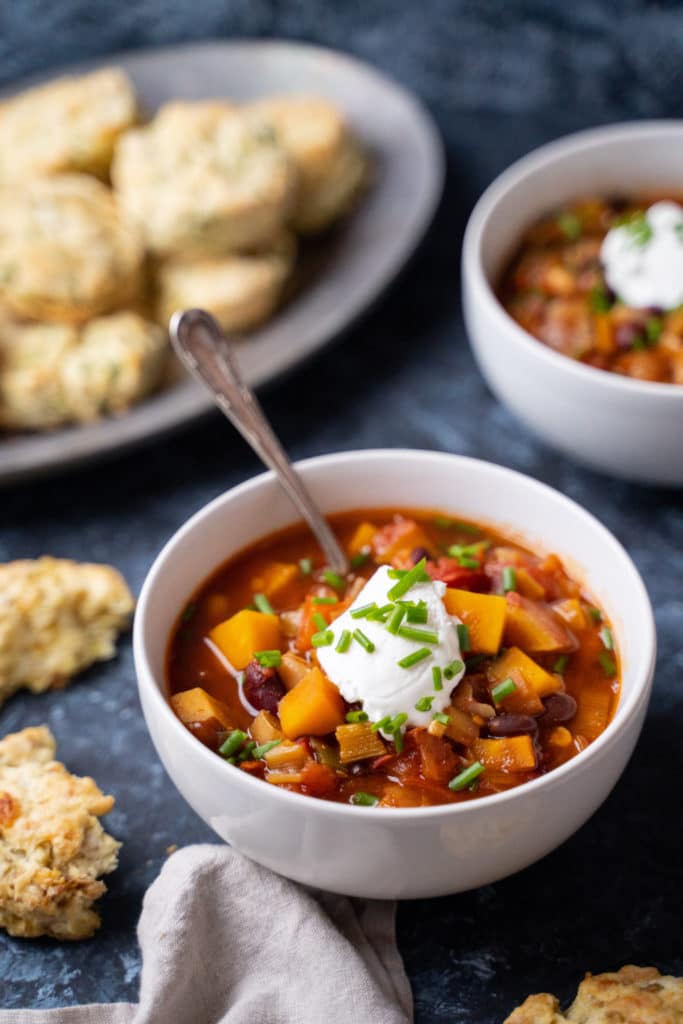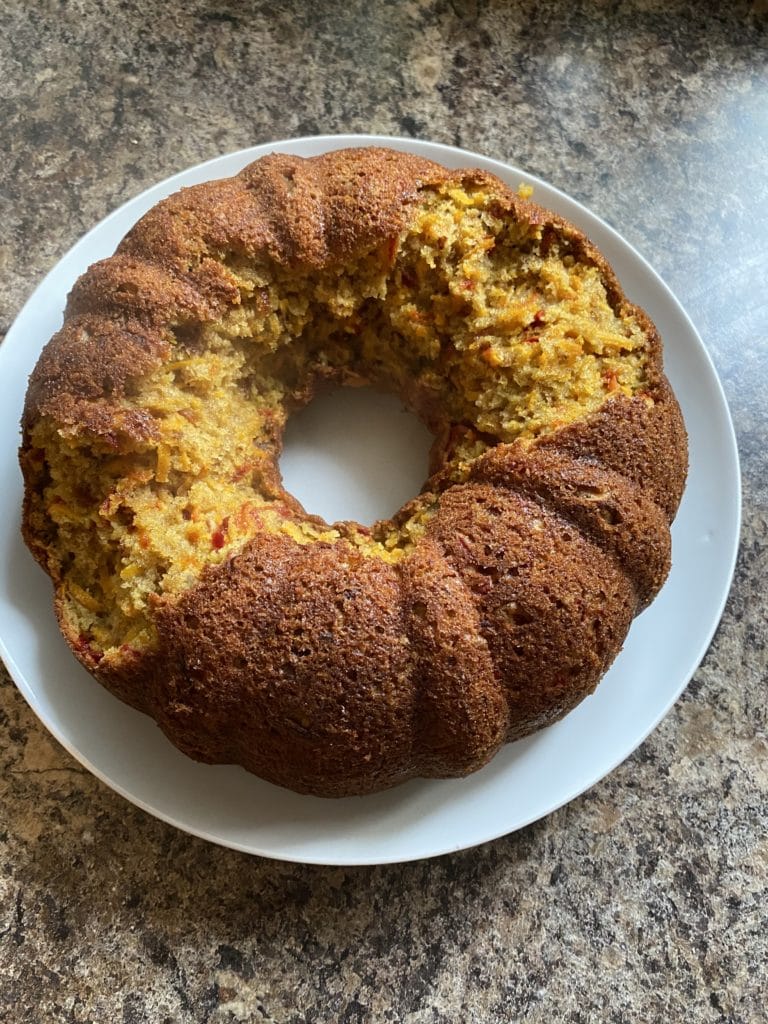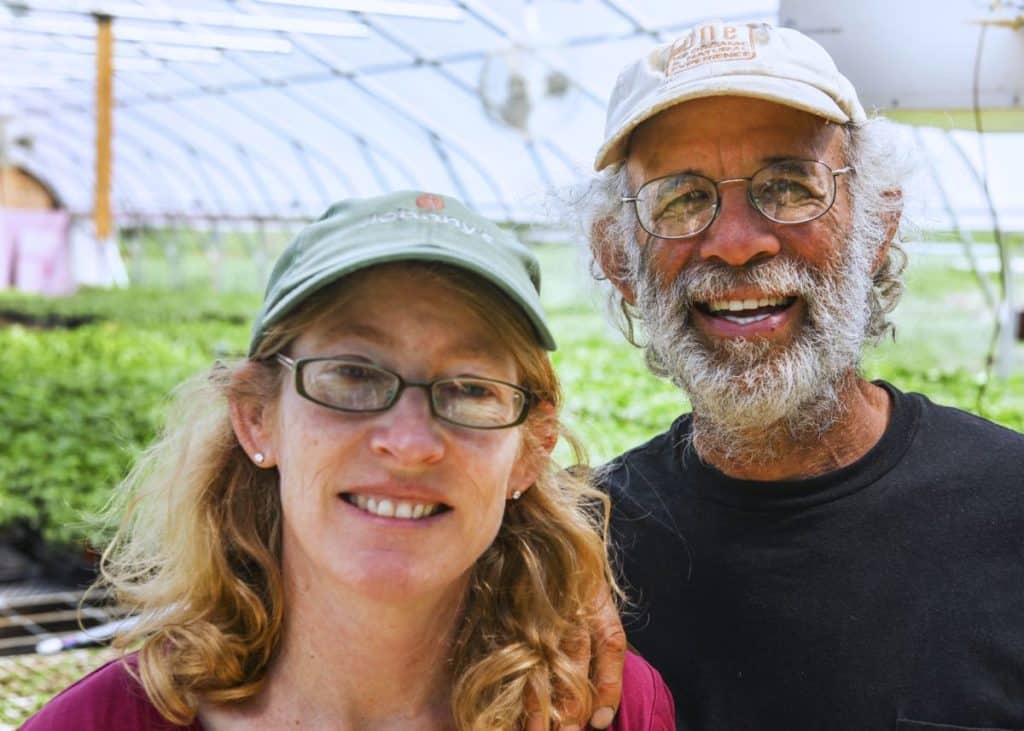Week #22; Our favorite COVID innovation
- On: October 14, 2020
 0
0

2017 CSA pack, prepandemic. From left, Kelsie, Kristin, Kerry, Jory, Rebecca, me, and John gather to fill CSA boxes. We can’t work in close quarters like this any more.
Back in April, Steve and I brainstormed how to safely pack CSA boxes during the pandemic. We thought “We’ll wear masks and hang sneeze guards and barrier curtains” to separate the team of people. One night, I realized that was not good enough. COVID-19 outbreaks were spreading in meat packing and vegetable processing facilities. Our scale is much smaller but the similarities are strong; we work inside, in a large team, and at close proximity. It was like a bolt of lightning once I recognized the risk, and the challenge of changing our system.
It was late at night and suddenly I couldn’t sleep. I put on my boots and went out to the barn to look at the situation with fresh eyes. Here’s what I figured out and Steve’s reaction the next morning.
Me: “We need to cut a hole in the pack shed wall.”
Steve: “Wait, what??”
Me: “We need to cut a hole in the wall. Then we can work in two rooms and pass boxes through the wall.”
Steve: “Wait, what???”
Me: “A hole in the wall, darn it.”
Steve, after a long pause, “Ahh.” I watched the light bulb go on.
Fortunately, there was an old, never-used door in just the right place. Blocked from opening by an essential post, it was unusable. We took the door off its hinges, shimmied it out from behind the post, and re-attached it on the other side of the wall. Voila, a new doorway.
In past years, we packed your CSA boxes along a ten-foot length of roller track. See the photo above. I rummaged in the barn loft and found an extra 40 feet of roller track. (We have a lot of useful stuff laying around the farm, mostly accumulated by Steve at farm auctions.) Now we pack your boxes along 50 feet of track, allowing us to spread out and maintain social distancing. The rooms we work in are well-ventilated with large doors open to the east and west, so we set up strong fans to keep the air moving along with the prevailing wind.
We can only talk to our nearest neighbors so now I’m a social director too. When possible, I try to cluster the high school and college-age workers in one room. In the adjacent room, all we can hear are shouts of “Tame Impala” or “Beach House!” Apparently they have raging debates about music.
The change has been unexpectedly helpful in other ways. Now we place our stacks of produce next to us. Space was so limited in the old system that the stacks had to be behind us, meaning you had to spin a full 180 degrees to pick up the produce. Midway through each pack, I’d remind everyone to reverse their spin direction. Otherwise, you get very, very dizzy. Between that and the lowered noise levels, we all feel better at the end of the job.
We’ve had to make numerous changes because of the pandemic but this one feels like a success: simple, effective and very inexpensive.
Beth

Starting at right, Mike puts a liner bag in each box, then sends it down the line to Janson and Chris (red shirt).

From the adjacent room, you can see Chris (red shirt) in the distance, as well as the new doorway to accommodate the extended roller track. Kristin, Chance and Raul complete the boxes.
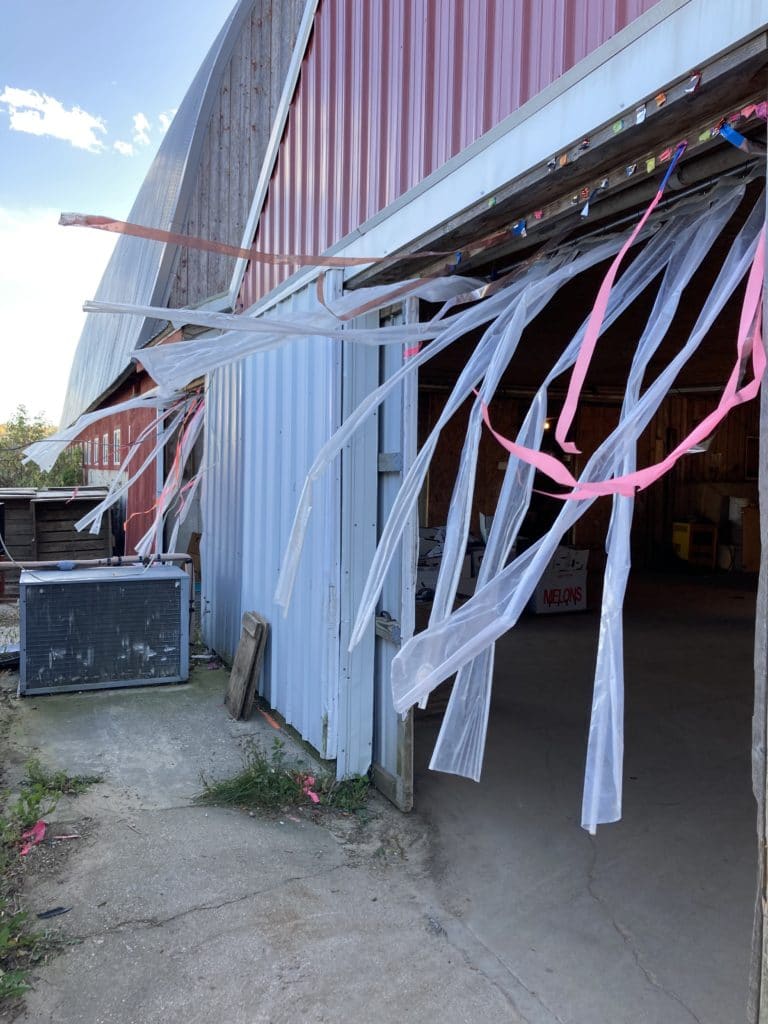
Open all the doors, work with the prevailing winds, …
This week/ Napa harvest

Maggie harvests the perfect napa cabbage while John photobombs to show off his guns. Note the rolled up sleeve.

Incoming! Maggie tosses to Mike who packs the napa into bins.
Veggie List & Veggie Notes
Week #22, October 15/16, 2020
– Weekly shares
– EOW/ purple
– Sampler/ sun
Napa cabbage (purple or green)
Butternut squash
Beets, ~2 lb
Carrots, ~2 lb
Peppers, 4 or 5 small green frying peppers
Poblano chiles (medium heat, in bag with beets), 3
Yellow or red or white onion
Cilantro
Scallions
– Most sites get broccoli.
– Some sites get cauliflower.
Next week’s box will probably contain Brussels sprouts, winter squash or sweet potatoes, carrots, celeriac, broccoli or cauliflower, some kind of greens and more.
Napa cabbage (large, pale green cabbage with crinkled leaves) – Storage: Napa stores very well. When refrigerated, it will keep for several weeks. Peel off the outer layer and it will be ready to use.
Napa cabbage is an interesting vegetable, useful for both fresh, raw salads and for cooking. Its most famous use is fermented kimchi. I like to prepare a fresh, unfermented kimchi. Same seasonings, but it’s ready to eat right away. You will be amazed at how much shredded napa cabbage shrinks when prepared this way. See here for an example, but cut the salt in half (or even less): Grilled Flank Steak with Kimchi-style Coleslaw.
Here are a few preparation ideas from the ‘Asparagus to Zucchini’ cookbook.
– Chop raw napa into green salads.
– Substitute napa in traditional coleslaw.
– Chinese cabbage cooks quickly. Steam 3-5 minutes, or until leaves are wilted down but remain slightly crisp.
– Substitute napa cabbage for common cabbage in recipes, but reduce the cooking time by 2 minutes.
– Napa cabbage is the main ingredient in egg rolls. Try making an egg roll mixture to eat as a cooked side dish instead of preparing time-consuming egg rolls.
Butternut squash – Storage: Winter squash store best at room temperature with good air circulation. No cooler than 50 degrees. On your kitchen counter works well. Keep an eye on your squash and cook promptly if any flaws develop. This batch of butternuts should be good for at least one month.
Hint: To make squash easier to cut, microwave on high for 30 to 60 seconds, depending on size of the squash. This will soften the rind and flesh, making it much easier to cut.
Beets – Storage: Cover and refrigerate. Beet roots will store for months. Wash well to remove leaf fragments. For all the cooking methods below, wash and scrub the beets but do not peel. The skins slip off easily once the beets are cooked and cooled.
Cooking beet roots on the stovetop: Slice or quarter, cover with water in a pot, and simmer until tender. This will take from 25 to 45 minutes depending on how large the beet pieces are. Drain.
Roasting beets in oven: Wash beets, but do not peel. On a sheet of aluminum foil, put beets (halved or quartered if large), salt, pepper and a few sprinklings of water. Seal the foil packet, and roast at 400 oF until tender, about 45 minutes to 1 hour. Slip off skins once cool.
Microwave: Slice beets in half and place in a large microwave-proof bowl. Add ¾ inch water and cover with a plate. Microwave on high until tender, about 9-20 minutes, depending on your microwave’s power. Drain and slip off skins.
Uses: Use cooked beets in cold salads, or dress simply with vinaigrette, onions, salt and pepper. Beets are also good tossed with sour cream, minced onion, fresh herbs and walnuts.
Carrots – Refrigerate in a plastic bag.
Peppers – Refrigerate. Eat soon. These were protected under row cover but exposed to cold nights. That shortens their storage life.
Poblano chiles (green or red, in bag with the beets) – Refrigerate. These should have medium heat but have been quite mild this year.
Red or white or yellow onion – Refrigerate the red or white onions. Yellow can be stored at room temperature.
Cilantro – Refrigerate in a sealed container. It wilts easily.
Scallions – Refrigerate in a bag or other container.
Broccoli or cauiflower – Refrigerate. The broccoli should be fine for one week. Cauliflower stores longer and these heads should remain good for two weeks. Wrap or cover in some way so they don’t wilt in your fridge.
RECIPES
Visit our 2020 Recipe Log or our 2019 Recipe Log or join our Facebook discussion group.
LOCAL THYME/ Cooking 101
Napa Cabbage and Chicken Salad with Carrot Ginger Dressing
Butternut, Beef and Wild Rice Soup
Mom’s Pickled Beets
LOCAL THYME/ Cooking 202
Chicken, Brassica, Pepper and Carrot Stir Fry
Roasted Butternut Squash and Onion with Tahini and Za’atar
Beet and Carrot Crisps
LOCAL THYME/ Quick & Easy Meal
Black Bean and Veggie Burritos
RECIPES FROM LAUREN
SLOW COOKER BUTTERNUT CHILI
Takes 20 minutes (active time) + 4-8 hours (in slow cooker)
Serves 8-12
1/4 cup olive oil
1 onion (any color), diced
2 garlic cloves, minced
2 poblanos, diced
2 green peppers, diced
4 cups water
2 28-ounce cans diced tomatoes
5 cups chopped butternut squash
1 can (15-ounce) spicy chili beans
1 can (15-ounce) black beans, rinsed
1/4 cup brown sugar
1/4 cup chili powder
2 tablespoons Kosher salt
2 tablespoons cumin
1/2 teaspoon cayenne powder
Pinch cinnamon
1. Add olive oil to crock pot or slow cooker along with onion, garlic and peppers. Turn crock pot up to high and let cook on it’s own with the lid off for 10-15 minutes while you peel and dice your squash and get the rest of your ingredients assembled.
2. Add remaining ingredients to the crock pot. It will be a tight fit even in a standard 8-quart crock pot. Place lid on crock pot and cook for at least four hours on high heat. If you are making it and leaving for the day, eight hours on low heat will work just as well.
3. Enjoy with cheese, diced raw onion, Greek yogurt and some roughly chopped cilantro. Store whatever remains in your fridge to eat throughout the weekend/week.
.
????
.

NAPA CABBAGE NOODLE SALAD
Adapted from Bon Appetit
Serves 4
Takes 30 minutes
3 tablespoons toasted sesame oil, divided
1 bell pepper, any color, seeded and diced
3 garlic cloves, minced
1/2 teaspoon red pepper flakes
Kosher salt
6 tablespoons fresh squeeze lime juice
3 tablespoons fish sauce
3 tablespoons honey
1 pound sirloin steak, bone removed and thinly sliced
6 ounces wide rice noodles
1/2 head Napa cabbage, stems removed and shredded (about 4 cups)
4-5 scallions (whites and greens), sliced
1 cup roasted peanuts, roughly chopped
1/2 bunch cilantro, diced
1. In a large skillet (preferably cast iron if you’ve got one), heat one tablespoon toasted sesame oil over medium heat. Add the bell pepper, garlic, red pepper flakes and a pinch of salt. Saute for 2-3 minutes. Pour into a large bowl followed by lime juice, fish sauce, honey, one tablespoon toasted sesame oil and 1/2 teaspoon Kosher salt. Whisk to combine.
2. Remove 1/4 cup of sauce and set aside to use later as dressing. Add steak to large bowl and toss to coat. Let marinate for up to 45 minutes (or as much time as you have; the flavors will be fine after 15 minutes if you are in a crunch) while you chop your vegetables. Stir every once and while to ensure all steak pieces are marinating.
3. Bring a large pot of salted water to a boil. Cook rice noodles according to package directions and drain once finished. Let cool for 5-10 minutes.
4. Make sure the cabbage and scallions are well-drained (if you rinsed right before preparing) and then toss with the 1/4 cup sauce you set to the side. Add another couple pinches of salt and toss to combine.
5. Pour the last tablespoon of sesame oil into your skillet (the same one you used before; you don’t need to wash it out) and get it nice and hot over medium high heat. Use tongs to transfer the steak (but not the marinade) into the skillet. Cook for 2-3 minutes until cooked through and then let rest for 5 minutes. Add steak and noodles to large bowl of cabbage mixture. Toss to combine (add herbs here if you are using) and serve warm with peanuts and cilantro on top.
.
????
.
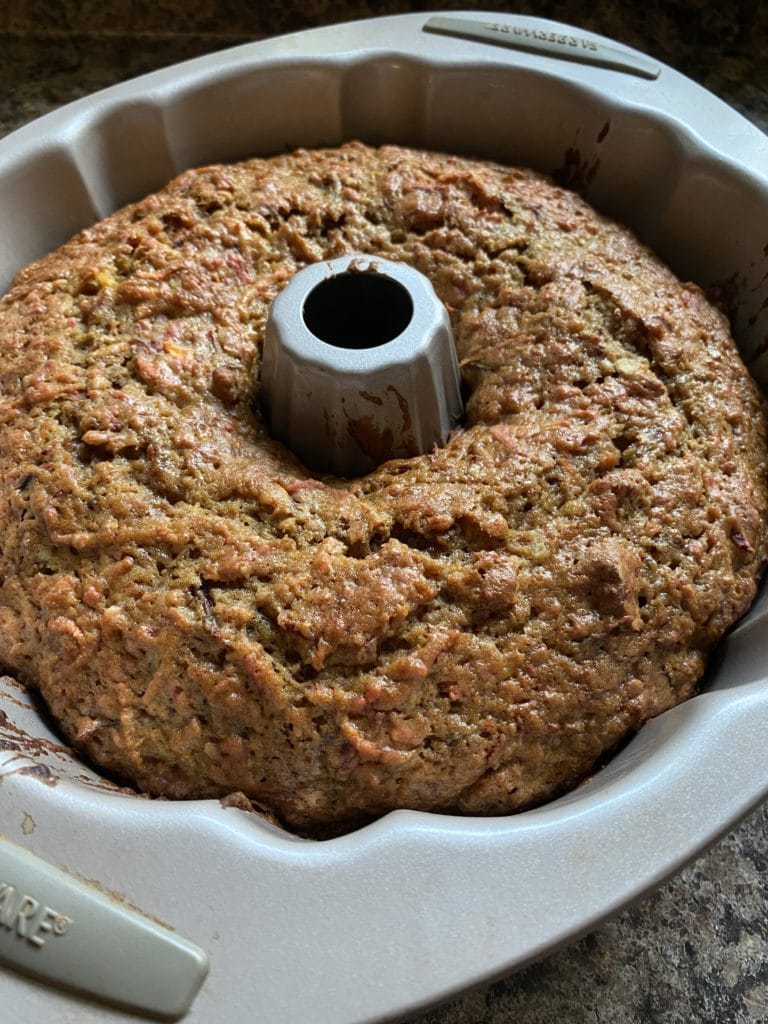
CARROT, BEET & APPLE CAKE
2 cups shredded carrots
2 cups shredded beets
1 cup shredded apples
3 eggs, well beaten
2/3 cup oil
1 teaspoon vanilla
2-1/4 cup flour
2 teaspoons baking powder
1 teaspoon baking soda
1/2 teaspoon Kosher salt
1 cup sugar
1 teaspoon cinnamon
1 heaping cup diced pecans
1. Preheat oven to 350 degrees and grease a bundt pan (or two bread loaf pans).
2. In a large bowl, combine shredded carrots, beets and apple. Add eggs, oil and vanilla and stir until well combined.
3. In a small bowl, combine all dry ingredients other than pecans. Mix well and then add into the wet mixture. Mix until no flour is visible then gently fold in pecans.
4. Bake for 40-45 minutes until a toothpick inserted into the middle comes out clean. Allow to cool for 15 minutes before serving (to avoid the accident I had).
.
????


